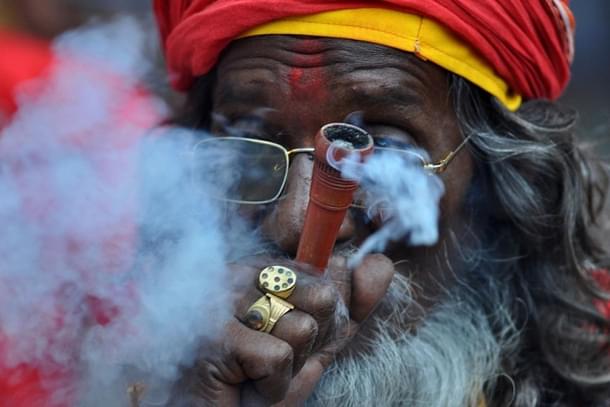Politics
The Folly Of Legalising Marijuana: Why Shashi Tharoor Is Wrong
Ravi Mantha
Jun 10, 2018, 04:20 PM | Updated 04:20 PM IST
Save & read from anywhere!
Bookmark stories for easy access on any device or the Swarajya app.


The promised new era is almost here. We are at the cusp of a technological revolution that will enable robots to perform many of the routine tasks that today employ human beings. Most jobs in transportation will be lost to autonomous vehicles, most jobs in factories and farming will be outsourced to untiring and self-replicating robots, and most jobs in the service industries will be taken over by artificial intelligence (AI) and machine-learning systems. The good news is that this will unleash productivity on a scale as yet unfathomable, which means that overall wealth will increase immensely. Assuming that society figures out how to ensure that income inequality does not go completely haywire, this wealth can be used to benefit all humans, most likely through a Universal Basic Income that will make sure that all of us benefit from the post-scarcity world that we are about to witness.
But there is a catch. What do we do with all these humans who have no jobs? How do we keep them entertained through a normal workday? Are Netflix and video games enough to occupy a whole lifetime without a need for purpose? There are optimistic and pessimistic views from futurists regarding how this society of the near future will evolve, but one trend stands out that needs to be addressed head on. The ongoing push for the legalisation of marijuana.
Shashi Tharoor, stalwart of the left-lib intellectuals and a Congress party lawmaker, makes the intellectual case for legalising marijuana in this article.
While I truly applaud him for taking on a very controversial subject and taking an unpopular stand, I will posit that his arguments are, to put it mildly, unpersuasive. He claims that he has “never tried a recreational drug in his life”, but would nonetheless like to legalise pot for the vast benefits to society including, “put a dent in corruption and crime, and provide the country an economic boost”. Let us examine the holes in his arguments.
Tharoor argues that “it’s high time for India to embrace the health, business, and broader societal benefits that legally regulating cannabis can bring”. But the first thing we need to understand about marijuana industry is that it is not a semiconductor or car manufacturing that benefits from continuous improvement, and creates long term jobs as the products get better and cheaper and more widespread.
Marijuana is merely an agricultural commodity, like corn, which if planted in sufficient acreage, will cause a massive glut within a year or two that will invariably cause a total collapse in prices. This is because unlike corn (which has uses from food to plastics to ethanol), people do not consume much marijuana. Even if the entire planet of 7 billion smoked a joint (of .4 grams) daily, you only need about 10 lakh tonnes a year of marijuana, which could be produced by the equivalent of planting about a million hectares, at a yield of around 1,000 kilogram per hectare. The US State of Oregon alone, has 7 milllion hectares of total farmland available, and it wouldn’t take much to put 15 per cent of it to use in growing marijuana for the whole world. In fact, Oregon is already facing a massive glut of the crop only a couple of years after its legalisation, as can be seen in this article.
Pot as an industry is dead on arrival, because you can grow a person’s lifetime worth of it for cheaper than a sack of potatoes. The only innovation possible in this drug business is higher yield and a more potent crop, which would cause even more damage to the population at large. Is this what we want?
As for creating new jobs, we have enough paan dabbas across the length and breadth of India to distribute this stuff. Besides, the marijuana equivalent of a beedi will be as good if not better than a cigarette equivalent, so there is no scope for a premium product in this industry, no matter what the packaging tells you. In fact, on a recent trip to California, I saw that the wholesale cost of an electronic cigarette cannister containing 300 hits of THC (the active ingredient in marijuana), was already less than $4, or the equivalent of Rs 1 a hit. This price could easily fall by 90 per cent with increased scale of production.
Tharoor’s argument that legalised pot “reduces crime” is flimsy at best. A perfectly acceptable solution is to decriminalise possession of small quantities, while going after the dealers and growers. This achieves the same reduction in crime, while keeping the overall consumption of the drug low, which is an equally important societal consideration, unless you believe that a drug-addled population is a good thing. A legal grey area is not a bad idea, something that we already employ informally in many aspects of civil society (religious use of marijuana is one such example) . This needs to be no different.
Unlike Tharoor, I did try pot in the past when I visited jurisdictions where it is legal, and I can report, from meeting many long-term habitual users, that it has highly damaging effects if you do it daily. The main downside to pot is that it reduces motivation, and hence productivity. There are numerous other side effects, including lung damage from the smoke, although there is a case for a regulated medicinal use of it in people with certain ailments like glaucoma and some forms of chronic pain.
Many states in the USA have already legalised marijuana, and it will suit us to wait a generation to see the effect it has on those societies before we do the same. What is the rush to hook a whole new generation on drugs, which is exactly what would happen if the marketing might of big business is unleashed on this drug?
The lessons of China in the 19th and early 20th century (see here), which underwent a humiliating population-scale addiction to opium by force at the hands of the European colonial powers, should also be studied properly to see what happens to societies when significant portions of the population are addicted to mind-numbing depressant drugs. Opium is no doubt a lot stronger than marijuana, but the potency of some of the pot I have seen in California recently is truly scary, and approaches opium in its ability to send its users into day-long oblivion. Today, you can walk around the streets of San Francisco or any town in California, as I did two weeks ago, and smell marijuana everywhere. I have never seen this level of low energy in the population. Everyone seems to be “high” on the stuff, rather one should properly call it “low” on the stuff since it is a depressant, and it’s just been a couple of years since legalisation. I would say, wait and see for a few years where this is heading, before we jump in headfirst into this morass.
Perhaps, the best argument for legalisation is that it decreases violent crime, and there is some evidence that this is indeed the case. It is also possible that it would decrease radicalisation of youth into violent ideologies, particularly religious or separatist ideologies. After all, who wouldn’t mind dropping a few bales of marijuana on an ISIS stronghold, and watching from afar as the ghastly place relaxes into a cloudy haze, the wild-eyed gunslingers chilling down into well-stoned peaceniks and swaying around the fire, as their guns fall silent forever. No wonder some extreme religious leaders are scared of this product, for it may dull the extremes of faith itself. I have never seen a pothead throw a single stone in anger or otherwise, they would just be too stoned to bother with real stones. But could Shashi Tharoor ever really dare propose marijuana as a covert solution to religious radicalisation?
I believe it is no coincidence that just as we are entering global era of mass unemployment, the clamour is growing worldwide to legalise pot. After all, pot smokers are not known to be violent agitators, so perhaps this is the ultimate dystopia that Tharoor and his nanny-state-liberal friends want: That marijuana becomes the new opiate of the pliant masses, who sit at home on a basic income and while away their lives getting high and watching TV, while their benevolent rulers get on with their own privileged pursuits.
Ravi Mantha, a foodie, is a nutritional and wellness expert and the author of The Baby Elephant Diet: A Modern Indian Guide to Eating Right. His first book on health is titled All About Bacteria. Ravi is an organic farmer, health guru and specialises in treating chronic pain and illnesses. He tweets at @rmantha2 and is on Facebook at www.facebook.com/ravi.mantha.author
Ravi Mantha, a lover of Idlis and food, is a nutritional and wellness expert and the author of “The Baby Elephant Diet: A Modern Indian Guide to Eating Right”. His first book on health is titled “All About Bacteria”. Ravi is an organic farmer, healthguru and specializes in treating chronic pain and illnesses. He tweets at @rmantha2 and is on Facebook at www.facebook.com/ravi.mantha.author





